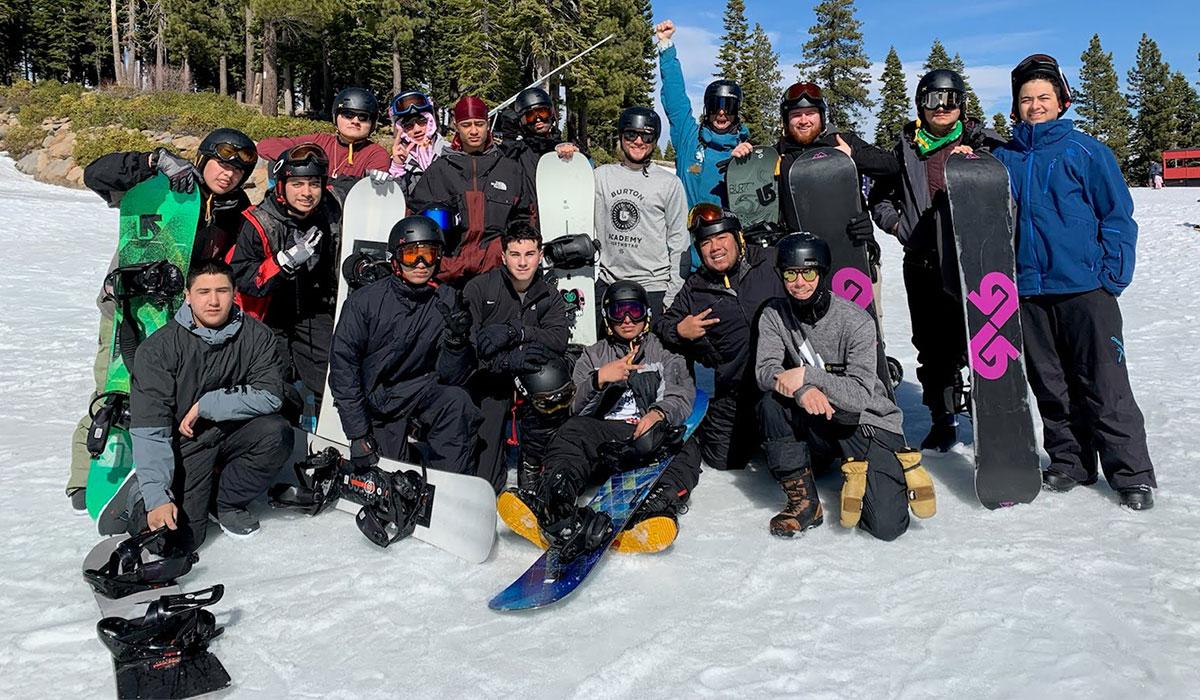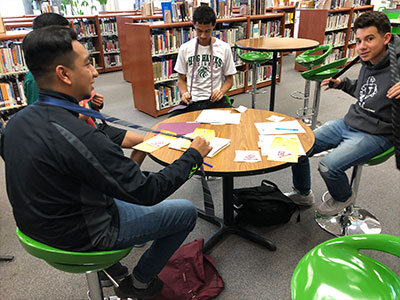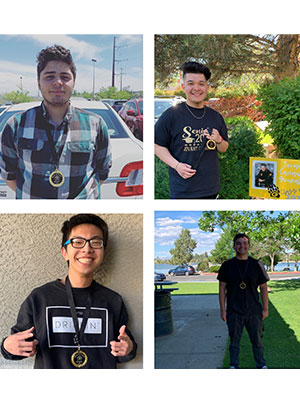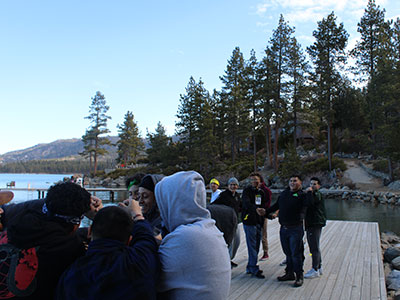
Henry Gonzales recently graduated from North Valleys High School and has been a part of TMCC’s Men of Color Mentorship Program (MOC) since he was a sophomore. Gonzales is one of 26 students from three different high schools who were honored at the MOC Virtual Graduation ceremony this year. The experience, he said, was life-changing. “As a freshman, I just wanted to fit in... and I didn’t really know what I wanted to do with my life.”
When Gonzales joined the MOC program as a sophomore, he was pleasantly surprised at the advice he received from his mentors: “they told me to do what my heart wants me to do...and not to listen to what other people say because it’s your career and it’s your life. That really opened my eyes, because I’ve always listened to everyone else. And, while other people’s opinions matter, [ultimately] I have to realize what I want to do.” It was the warm, welcoming environment and the heartfelt guidance that convinced Gonzales that MOC was right for him.

Men of Color mentors work with the students in the program on building important skills, such as leadership, and learning to tie a tie.
“They even taught me how to tie a tie,” he said. “I thought that was pretty awesome. Even though it’s something small...it really means a lot. And those little things add up throughout the years. I really loved going to all the meetings.”
However, the true test came in the recent shelter-in-place orders when Gonzales completed his high school assignments from home. Although many students struggled with feelings of isolation this semester, Gonzales maintains that the community and camaraderie of the MOC program was a highlight of the past few months. “We all got into a group video call, and just messed around. We had fun: we told jokes and laughed. With all these hardships, it can be difficult to look on the bright side, but that meeting really brought out the bright—how people are supposed to interact together. I hadn’t met half the other students on the call, but we still interacted like we’d known each other all our lives. In Men of Color, we are all able to really connect with one another.”
The support and guidance from fellow MOC students and the mentors has helped Gonzales to realize his dream of enlisting in the Air Force while he pursues his associate degree in business from TMCC, with the eventual goal of running his own business one day. The biggest changes he’s experienced, though, have been internal ones. “I’m still kind of shy, but before [the MOC program] I didn’t know how to put myself out there. [This year,] people call me a social butterfly because I’ve discovered I love talking to people. MOC has just taught me so much and talking to new mentors every year helps. They are just so genuine, and it’s a comfortable environment for everyone.”
Men of Color Program
The Spring of 2019 witnessed the graduation of the program’s first cohort: ten students from Galena High School defied the statistics that clearly demonstrate that young men who identify as a minor are among the least likely to graduate from high school and to continue their educational journey to college. Those students graduated from Galena High School and are continuing their journeys to become the first in their family to earn a college degree.
According to lead mentor Carlos Castro Peralta, one of those students, Christiaan Lizaola is the program’s shining star. “We’re definitely proud of him. Whenever we go out, we have him to speak to the other students about joining the MOC program as a sophomore. He admits that, before joining MOC, he didn’t know college was an option for him,” said Peralta, who remembers that Lizaola came from a single-parent household where his mother worked full-time and raised four boys. “Christiaan is a very good student. His mom did a great job with him. But, he still didn’t have resources that told him how to go to college. Miguel was his mentor, and he showed him everything. He got a bunch of scholarships, and now he’s working at the Diversity and International Student Center and Office (DISCO). That is our biggest success story.”
In addition to pursuing a degree in Accounting, Lizaola is a peer mentor in the MOC program. Miguel Martinez, who founded the Men of Color Program in 2016, said this is his vision for the program. “As the program grows, I would like it to build on itself, and to keep a cyclical aspect to it…. That way, we are making sure that we are developing leaders, and that these students are ready for the next steps in their lives.” Martinez, who mentored Lizaola in the MOC program, and is now his supervisor at the DISCO. The evolution in that relationship is helping Lizaola to continue his journey, which included attending a professional conference in Chicago last fall.
“We’re exploring other areas of his development. This summer, he is going to work on how to be a better presenter, and how to improve his conflict resolution skills,” said Martinez.
Like Lizaola, the MOC program is also undergoing remarkable growth. The program, which began with a cohort of ten students, has grown to include 120 high school students from Galena, North Valleys, Hug and Reed High Schools. The program design is simple: three lead mentors (Miguel Martinez, Carlos Castro Peralta, and Jimmy Roque) oversee student-mentors, who are first and second-year students at TMCC. Each month, a Lead Mentor and two or three student-mentors go to their assigned high school to conduct meetings with the high school students who participate in the program. The lead mentor prepares the lesson plans and handouts and prepares the student-mentors, who will help to facilitate the discussion.
“We used to have one-on-one mentoring sessions, but we can’t do that anymore,” said Peralta who has been with the MOC program since it began. Instead, students are seen in groups according to their year in high school. And yet, the benefits of this mentoring program are clear. The persistence rate of this graduating cohort is 98%, and of the 98% that began the program as high school sophomores, only one student was unable to complete his high school degree from his traditional high school, but will do so at an alternative high school. “That’s a huge number...especially for this cohort, and this population, which faced unusual challenges this past semester,” said Martinez.
Martinez, who has conducted research as an undergraduate and graduate student on questions of why Latino men persist in higher education, as well as the topics of affirmative action in college admissions, was approached by the Vice President of Student Services and Diversity Estella Gutierrez who wanted a mentor program at TMCC to support young men who identify as a racial minority. According to statistics, this demographic is the least likely to attend college, much less graduate.
Martinez proposed a mentoring program that would work with young men in the eighth grade. “If we started working with students that are already at TMCC, they are already dropping out,” said Martinez. “So, I proposed to start working with students in middle school, to move them through the educational pipeline. Honestly, that’s where you start seeing the discrepancies, pass rates and detention, start to influence decisions and attitudes. Everyone liked the idea, but thought eighth grade students were too young. We compromised, and that’s why the MOC program recruits high school sophomores.”
Even though many of the high school seniors shifted their focus away from school during this period of remote learning to focus on their own employment or helping their parents out at their jobs, they nonetheless demonstrate that the program helps students achieve academic success that defies the statistics.

Program graduates are awarded medals. This year, graduates wear their accomplishments proudly.
According to Martinez, 80.7% of this year’s cohort is enrolled in higher education already. “A lot is the exposure to college, and making it a reality for them, seeing how tangible it actually is,” said Martinez. “Literally if anything comes up, I can just text them or call them—the value of that relationship is huge—to help them to achieve these goals.” Of the 26 graduating seniors, 21 are already enrolled in college. Fourteen are going to pursue degrees at TMCC, six at UNR. Three students are enlisted in the military and two are going to enter the workforce.
The remarkable success of this program is made possible by the relationships that the students form with each other and with the mentors in the program. “I think that’s one of the things I enjoy seeing: the [students’] growth and our relationships that grow closer over time,” said Peralta.
Why Mentoring Matters
Peralta knows firsthand the power that supportive relationships play in one’s academic journey and life because he’s experienced it himself. Peralta grew up in Incline Village, Nevada and under the guidance offered by his father and older brother, he knew that college was certainly in his future. “Everything was very structured for me growing up… I had a path to college, so I went to UNR and got my degree.”
After, Peralta began working for Nevada State GEAR UP (Gaining Early Awareness and Readiness for Undergraduate Programs) at a middle school in a low-income neighborhood in Las Vegas. The program, which offers support for low-income students that support their journey through their first year of post-secondary education. “That’s where I learned that not a lot of students have those opportunities or the structure at home that I had. [Instead], a lot of students come from single-parent households where [the parent] is constantly working. Those parents aren’t focusing on college [for their children]; they are focusing on paying the bills and putting food on the table.” Peralta brings that experience to his work as a lead mentor for the MOC program, where he provides students with guidance and support that young people need to realize their educational journeys beyond high school.
Peralta is joined by TMCC students who act as peer mentors. These students are literally a year or two older than the high school students they mentor, but they too provide powerful examples of what the future can hold. Peer Mentor Carlos Guerrero, is a first-generation college student who graduated with his associates in business from TMCC in the Spring of 2020, mentors students from Reed and North Valleys High Schools. The experience, he said, has also taught him life-lessons he will carry with him into the future.
“I learned to really slow down and listen to the things [the students] were saying. Sometimes, they would say something, and I felt like I fully didn’t understand… and I realized I needed to put myself in their shoes to understand what their question was, or really what they were trying to say. So, I’ve learned to slow down and to take the time to figure out how to help them with their question.”
Guerrero became a peer mentor when he began working at TMCC’s DISCO in August 2019. “I was questioning myself, wondering if I could become a mentor,” he said. However, Guerrero’s own unlikely journey to college is one that speaks to the mission of the MOC program. “I would have benefited from a program like this, because [I didn’t think] I was going to go to college. Not very many [people] from my small town in Nevada do. So, having a support program like this and having someone to check up on you... it’s amazing. Mentoring is definitely an experience I’m going to cherish for a long time.”
Camping and Looking to a Bright Future

In January 2020, the Men of Color program’s annual camping trip took students to South Lake Tahoe.
The highlight of every MOC academic year is the annual camping trip, which is offered to 15 participating students who have completed other program requirements (such as attending monthly meetings and completing their community service hours.) This January, MOC students went on a weekend-long camping trip in South Lake Tahoe. “We had a huge cabin, and we did a lot of activities and cooked a lot of good food,” said Peralta. This year, in addition to the formalized lessons in leadership, communication, and self-confidence, the students were also treated to a day of snowboarding lessons at Northstar Resort thanks to a partnership with Adventure Risk Challenge, a local non-profit.
“Spending 48-hours with the students really allowed all of us to see who they are,” said Martinez, who explained that informal lessons on every topic from how to chop an onion, clean up after cooking to discussing how to be a leader are all part of this mentoring program. “We are very intentional in trying to hit layers of motivation and development of who [these students] are. It’s beyond their academic and professional selves. We want them to understand who they are as men, and what does that mean to them? Really, it boils down to being a good person, and having a good heart.”
Celebrating the MOC Class of 2020
This year, the MOC program celebrated its graduates in a virtual ceremony that honors their hard work in moving forward into futures that include college education, something many of them didn’t, as high school sophomores, consider. Huy Pham, who just graduated from Reed High School, is joining the National Guard and will continue his educational journey at TMCC where he plans to obtain an associate degree in business.
Pham, who came to the United States from Vietnam when he was seven years old, struggled with language and cultural barriers. He joined the MOC program as a high school sophomore. That was the step that got him thinking about going to college.
These days, Pham is looking far into the future. In the next five years, he plans on completing his four-year degree in business from UNR in order to open a physical store for his line of clothing, which he describes as “street-wear... that people can wear on an everyday basis, and that, while they are wearing it, boosts their self-confidence.”
He started designing and creating his line of clothing in high school, and before the COVID-shutdown, he was selling sweatshirts, phone cases, and stickers to other students. He would like his brand to expand to other items of apparel and to reach an international market.
He said his dreams come from the MOC Program where the mentors encouraged him to think beyond high school. “Everyone struggles in different things,” said Pham. “Some people might even have family problems, or problems with school, or not have any kind of support. But that’s what MOC gives—a sense of family and support. They really do the best to support you all they can.”
For more information about TMCC’s Men of Color Program, contact the Equity, Inclusion and Sustainability Office at 775-673-7072 or email moc@tmcc.edu.






